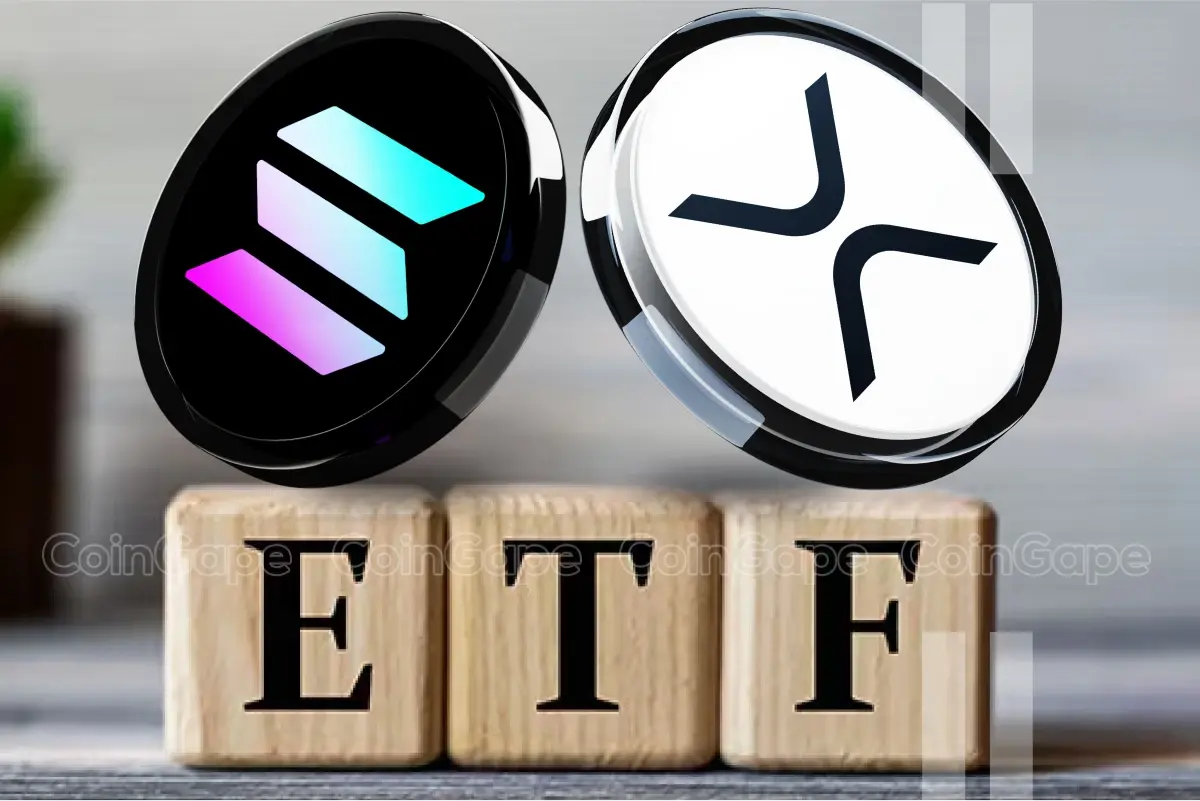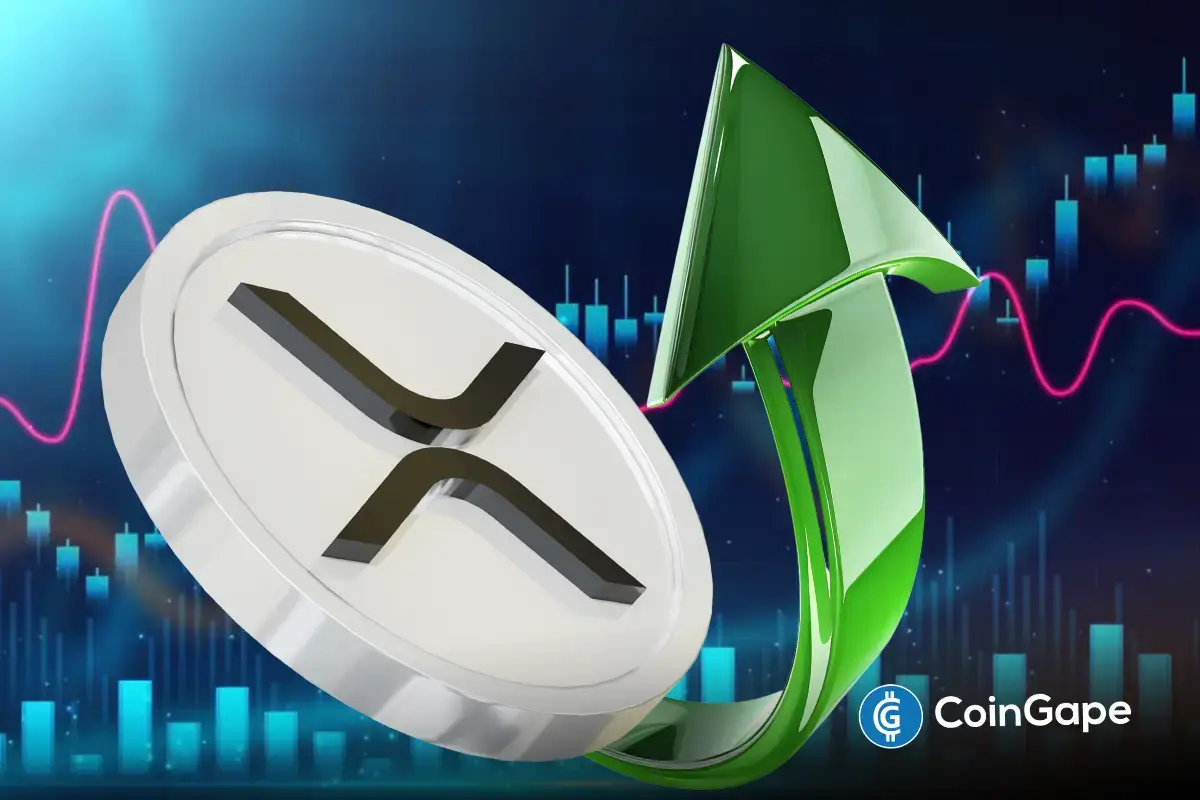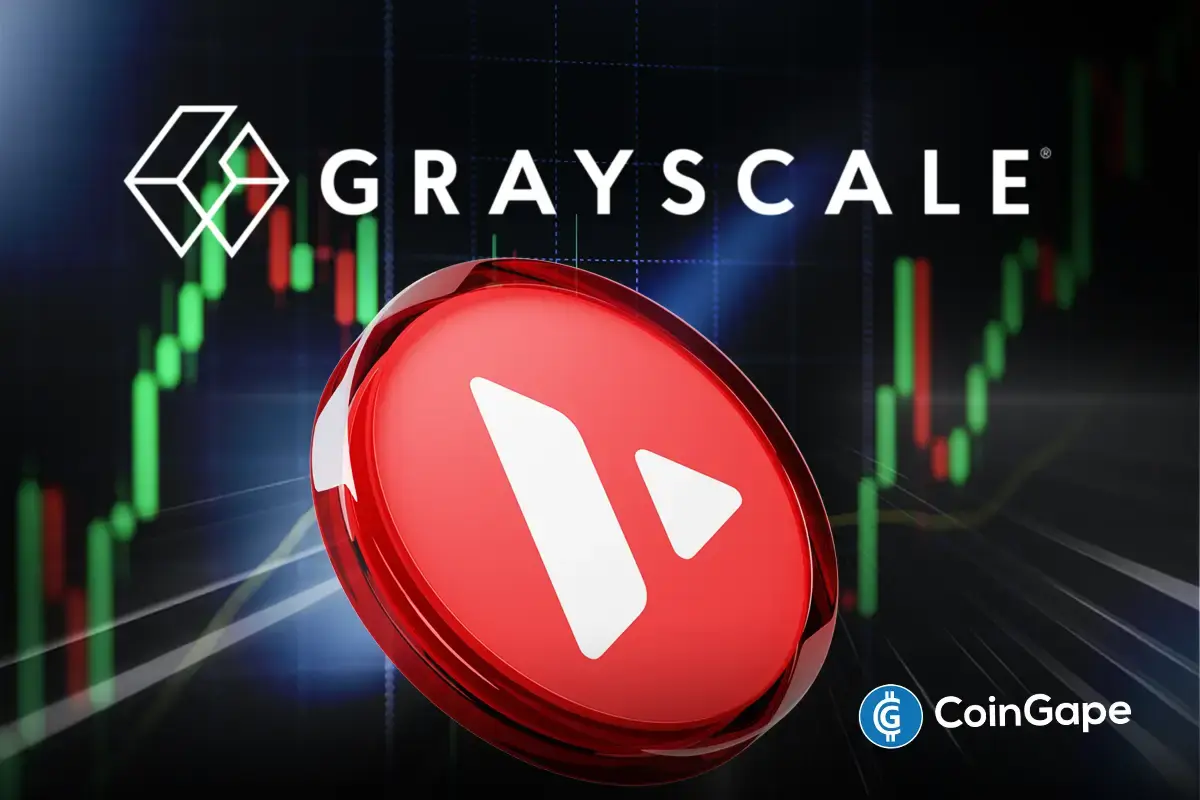Altcoin
Why There Will Be Several XRP & Solana ETF Filings This November?

Since Trump’s re-election, Bitcoin and other altcoins such as XRP or even ADA price surged on expectations of less strict cryptocurrency regulations during his administration. Several new ETF filings, among which are XRP and Solana, are expected during November.
Many investors hope his favorable attitude toward cryptocurrencies will translate to laxer policies, perhaps encouraging more spot altcoin ETFs beyond Bitcoin and Ethereum. However, many issuers have been holding off until after the election, believing that many could see their ETFs pass under a Trump administration.
As discussions swirl around the possible departure of SEC Chair Gary Gensler and an incoming crypto-friendly successor, the timing is ripe for such filings taking center stage.
Crypto Prices Soars on Trump Re-Election, Spot XRP, Solana ETF Hopes Rekindled
Since Trump’s re-election, Bitcoin and other altcoins have surged on expectations of less strict cryptocurrency regulations during his administration.
Recently, the CEO of ETF Institute, Nate Geraci, expects an array of new applications for spot cryptocurrency ETFs this week. Although the SEC has certified many spot Bitcoin and Ethereum ETFs in recent years, it has denied most of the rest. With hope rejuvenated following Trump’s appointment, says Geraci, applications for spot ETFs on XRP, Solana, Cardano, and other altcoins could be in this week as well.
Prediction…
There will be several spot crypto ETF filings this week.
XRP, SOL, ADA, etc.
Assume multiple issuers were highly prepared for election results.
No downside to getting aggressive now.
— Nate Geraci (@NateGeraci) November 11, 2024
Geraci added that many issuers have been waiting on the US election results and are now poised to move forward, believing Trump’s administration will smooth the path for ETF approvals. Though the SEC already has applications for Solana and XRP under review, experts say Trump’s election raises the likelihood of approval for the SOL and other altcoin ETFs.
With rumors that the head of the US Securities and Exchange Commission, Gary Gensler, is about to leave office, names such as Dan Gallagher, chief legal officer at Robinhood, among others, have emerged at the fore as the first choices to replace Gensler after he leaves office.
During his stint on the commission, the SEC approved several Bitcoin ETFs. Gensler gave the deciding vote to the repeated filings in the face of massive protests from the crypto community. Commissioners Jaime Lizárraga and Caroline Crenshaw had initially moved to block the Bitcoin ETF approvals.
However, Gensler consistently voted with commissioners Mark Uyeda and Hester Peirce, both Republicans. He pulled off a surprise move in May when he approved multiple spot Ethereum ETFs that started trading in July.
XRP ETF Filings Surge After Trump Win, Price Skyrockets
As filed, a spate of other altcoin ETFs is on its way, including a July VanEck filing for a Solana ETF, while multiple issuers have submitted applications for a spot XRP ETF.
Asset manager 21Shares has filed a spot XRP ETF, the third such filing after Canary Capital and Bitwise. This came on November 1 and included a Form S-1 for shares to be issued and traded in 21Shares Core XRP Trust, which was to be listed and traded on the Cboe BZX Exchange.
The filing explains that the trust does not represent a direct exposure to XRP but will provide investors with indirect market access. After the news, Ripple CEO Brad Garlinghouse claimed the SEC has “lost its battle on cryptos.”
The value of XRP was up 15.7% over the week and consistently stayed above the $0.50 threshold. Its market cap currently stands at $33.6 billion. According to Amonyx, an XRP influencer, technical indicators point towards the price touching a mark of $260. That sounds too ambitious, and a realistic target in the near term would be breaking $1 this Q4.
The Next leg UP to ATHs Will be Very very FAST
U ready? #XRP 👀🔥 pic.twitter.com/gDLLTeSzxs
— Amonyx (@amonbuy) November 11, 2024
SOL price is currently hovering around $219, marking a 2.79% increase in the last 24 hours. It’s also one of the top-performing assets among the top 20 cryptocurrencies by market cap, boasting a significant 34% gain over the past week. This impressive weekly rise has positioned SOL as a standout in the market, drawing attention for its strong upward momentum.
Trump’s Re-Election Boosts Solana’s Bullish Outlook
Throughout his campaign, Trump has uttered the ambition to make the US the world’s hub of cryptocurrency. This ambition also involves promise to replace the current chairman of the SEC, Gary Gensler, whom he has criticized for being too hard on the crypto sector.
Given the crypto-friendly stance, this could further encourage conservative investors to invest in Solana-based ETFs. On many occasions, supportive legislation has invited market confidence, and the potential for effective cryptocurrency policies under Trump’s administration could be one of the drivers for long-term investment in Solana.
While regulators are moving toward a more concrete regulatory environment, Solana is setting up for broader use cases and more sustained growth.
Solana’s recent surge above the $220 level has been considered the excitement point for many in the market. Some experts even suggest that Solana could surge to as high as $300 by the close of the year.
Disclaimer: The presented content may include the personal opinion of the author and is subject to market condition. Do your market research before investing in cryptocurrencies. The author or the publication does not hold any responsibility for your personal financial loss.
Altcoin
Did XRP Price Just Hit $21K? Live TV Display Error Goes Viral

The recent XRP price glitch on live American TV has created ripples in the crypto community. In an episode of “American Sunrise Early Edition” on Real America’s Voice, the value of XRP soared to a staggering $21,355, marking a 961,936% uptick from its actual price at the moment.
Notably, other cryptocurrencies like Bitcoin, Ethereum, Solana, Dogecoin, and Cardano also saw variations in their prices during the live TV program. Though the host, Jake Novak, addressed Bitcoin’s price anomaly, he overlooked the XRP glitch.
XRP Price Glitch on Live American TV: Key Details
During an episode of American Sunrise Early Edition on Real America’s Voice, the show displayed incorrect prices for major cryptocurrencies, including Bitcoin and XRP, with the values being significantly different from their actual market prices. For instance, the XRP price was displayed as $21,355, up by more than 961,936% from its actual market value of $2.1.
Throughout the market outlook segment, the XRP price glitch remained on the screen, fluctuating between $2.22 and $21,355. The community largely responded to the incident, drawing the team’s attention to the error.
This incident follows the increasing anticipations of the Ripple lawsuit settlement, driven by the SEC’s recent progressive stance.
XRP’s Repeated Price Glitch
As highlighted by the community members, it’s not the first time that XRP has experienced a price glitch. Historically, the token has seen dramatic price variations due to system errors.
In June 2024, XRP was shown on TradingView at $9,864, a point much higher than its original value. A glitch on Binance presented XRP at $5,791 due to data feed issues in October. In a similar incident, XRP’s value was incorrectly displayed on CoinMarketCap in November 2023, with the platform showing it at $1,919, a significant deviation from its actual market value.
Host Addresses Bitcoin Price Anomaly, Overlooks XRP
Notably, the technical issue on the American live TV has resulted in incorrect price displays for not just XRP, but several other cryptocurrencies. The episode presented Bitcoin’s price at $43,636, marking a significant drop of around 50% from the original value.
Meanwhile, Ethereum (ETH) rose to $6,000, a 156% surge and Solana (SOL) increased to $2,896, up by 1,983%. Dogecoin (DOGE) skyrocketed to $32, a 15,900% increase from $0.22, and Cardano (ADA) increased to $69, a 10,198% rise from $0.67.
Addressing the issue, the show’s host, Jake Novak, stated that the “graph had gone a little funky.” However, he only addressed the Bitcoin price glitch, overlooking the issues with other cryptocurrency values, including XRP.
How XRP Reacts To the Incident?
As of press time, XRP is valued at $2.10, with a notable decline of 5.5% over the past 24 hours. On a weekly and monthly basis, the token has experienced massive dips of 12.9% and 7.3%, respectively.
Despite the prevailing negative trend, the XRP price is facing a positives sentiment within the community. This is significantly evident in the 14.5% surge in the trading volume, currently at $4.18 billion.
Disclaimer: The presented content may include the personal opinion of the author and is subject to market condition. Do your market research before investing in cryptocurrencies. The author or the publication does not hold any responsibility for your personal financial loss.
Altcoin
Chainlink Price Leads Altcoin Selloff, Where Is LINK Price Floor?

The price Chainlink (LINK) has reversed its earlier growth trends after the broader market nosedived in mid-day trading. The current breakdown has triggered a new worry among investors for a coin that had the prospect of reclaiming its spot among the top 10 largest digital currencies.
The LINK price has fallen to $14.1, down 9.12% in the past 24 hours. This latest selloff has also raised the question of where the LINK floor is triggered.
Bitcoin Price and Bollinger Bands Insight
The Chainlink drawdown is steep and depends on the Bitcoin price selloff triggered by today’s US Core PCE figures. LINK has recorded more selloffs than most altcoins in the top 20 based on a percent decline over 24 hours.
LINK has fared much better on longer timeframes, as the token is still up by 1% in the past 7 days. The token’s Year-to-Date (YTD) growth is 34.76%, making analysts wonder if more selloff is inbound.


The LINK/USDT 4H Chart offers insight into the Chainlink price outlook. The current price is trading at the lower Bollinger Bands, $14.04. The deviation from the upper bands is a sign of intense volatility, which may or may not go well for the token.
Over the past 30 days, the LINK price has not dropped below $13, which is now classified as the next support level to watch.
LINK and Dependence on the General Market
The broader market is divided on what is next for Chainlink. The Oracle service provider remains one of various institutional clients’ most used blockchain protocols.
This means that the adoption of its services depends on the market or external factors.
Besides this, the price action of Bitcoin and other altcoins is also a major determinant of its potential rebound. At the time of writing, the price of BTC has dropped to a new weekly low of $83,872.69, down by 3.77% in 24 hours. With the bearish outlook, Peter Brandt said Bitcoin price crashing to $70,000 is not impossible.
With Chainlink’s dependence on Bitcoin, the altcoin may maintain its current outlook until the top coin prints a new rally.
Major LINK Price Catalyst to Watch
Per an earlier CoinGape report, Chainlink inked a deal with the Abu Dhabi Global Market (ADGM). This LINK partnership with ADGM will support the development of compliant frameworks for tokenized assets, expand blockchain adoption, and promote regulatory dialogue within the UAE and globally.
In an earlier LINK price analysis, projections were made that this partnership may push the token’s price to a high of $44. For now, the protocol’s price action signals caution overall.
Disclaimer: The presented content may include the personal opinion of the author and is subject to market condition. Do your market research before investing in cryptocurrencies. The author or the publication does not hold any responsibility for your personal financial loss.
Altcoin
Analyst Reveals Bullishness On Ethereum Price At This Point, Can It Hit $4,000 Again?


The Ethereum price has been in a sharp decline in the past months, underperforming compared to Bitcoin (BTC) and Solana (SOL). Despite its unwillingness to experience a significant price increase, a crypto analyst has revealed his bullishness for ETH, predicting a potential recovery to $4,000 before the end of the bull cycle.
Ethereum Price Projected To Reach $4,000
Crypto analyst Astronomer has announced his bullishness on the Ethereum price outlook, predicting a potential rally to $4,000. In a rather lengthy post on X (formerly Twitter), the analyst highlights several technical signals that suggest ETH could soon revisit this key price target.
Notably, the ETH price is positioned at a clear support zone between the $1,700 and $1,900 range. Historically, this range has acted as a launch pad for recoveries, with previous declines to this area triggering a strong price surge.
While Ethereum has underperformed against Solana during this bull market, it has still doubled since its 2022 low, which is a better outcome than most altcoins. Further highlighting his bullish stance on ETH, Astronomer revealed that he had swapped BTC for ETH, holding a strong conviction that the latter will eventually outperform the former by the end of the cycle.

Based on the analyst’s chart, ETH is currently trading within a long-term macro price range between $1,700 and $4,500. The cryptocurrency recently retested the bottom of this range, which historically led to a bounce back toward a price high above $4,000.
Astronomer also notes that Bitcoin has already set its weekly low, meaning that Ethereum’s price movements could soon align with the pioneer cryptocurrency’s recovery. If ETH can reclaim the $2,100 level, the analyst predicts a rapid move toward $4,000 in a few months.
With the next Federal Reserve monetary policy scheduled for mid-April, the market may see renewed bullish momentum that could benefit Ethereum’s price trajectory. Another major development that supports the analyst’s bullish projection for Ethereum is its performance in March 2024. At the time, the altcoin swept a previous price high but didn’t sustain a breakout, leading to a prolonged correction.
However, Astronomer suggested that this price trend insists on revisiting $4,000, particularly after Ethereum hits a range low. The analyst notes that ETH is now at this critical low, which could indicate that the bottom is in, signaling a potential move to new highs.
ETH Market Sentiment Hits Rock Bottom
While sharing his bullish forecast for ETH’s price during this bull cycle, Astronomer also revealed that Ethereum is facing a heavy bearish sentiment due to its prolonged underperformance. According to the analyst, Ethereum’s current market sentiment is worse than Bitcoin’s, with negative narratives dominating discussions across the crypto community.
Some claim that ETH lacks a proper use case, while others suggest that the Ethereum Foundation may be selling. Despite this, Historical data shows that when ETH hit similar low levels in late 2017 and 2021, the cryptocurrency experienced a subsequent rally to new ATHs. The latest sentiment score shows Ethereum has hit rock bottom at 14, signaling extreme fear and uncertainty, which often precedes major price rebounds.
Featured image from Adobe Stock, chart from Tradingview.com

Editorial Process for bitcoinist is centered on delivering thoroughly researched, accurate, and unbiased content. We uphold strict sourcing standards, and each page undergoes diligent review by our team of top technology experts and seasoned editors. This process ensures the integrity, relevance, and value of our content for our readers.
-

 Altcoin22 hours ago
Altcoin22 hours agoDogecoin Price Set To Reach $1 As Once In A Year Buy Opportunity Returns
-

 Altcoin16 hours ago
Altcoin16 hours agoPiDaoSwap, Trump Media, & Grayscale
-

 Regulation21 hours ago
Regulation21 hours agoAVAX Price Eyes Rally To $44 As Grayscale Files For Avalanche ETF
-

 Regulation16 hours ago
Regulation16 hours agoUS SEC Drops Charges Against Hawk Tuah Girl Hailey Welch
-

 Market24 hours ago
Market24 hours agoSatLayer CEO Luke Xie Talks Bitcoin Restaking and DeFi’s Future
-

 Altcoin24 hours ago
Altcoin24 hours agoBlessing or Curse for the Crypto Market?
-

 Market23 hours ago
Market23 hours agoHedera Falls 4% as Bears Dominate: What’s Next for HBAR?
-

 Regulation18 hours ago
Regulation18 hours agoFDIC Revises Crypto Guidelines Allowing Banks To Enter Digital Assets





















✓ Share: